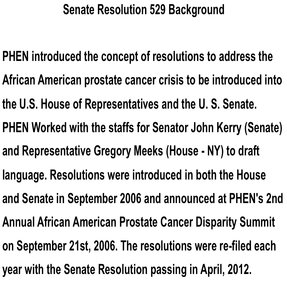information and statistics
Senate Resolution 529
Senate Resolution 529
112th CONGRESS
2d Session
S. RES. 529
IN THE SENATE OF THE UNITED STATES
July 26, 2012
Mr. Kerry (for himself, Mr. Chambliss, Mr. Inouye, Mr. Wyden, Mr. Akaka, and Mr. Cardin) submitted the following resolution; which was considered and agreed to
RESOLUTION
Recognizing that the occurrence of prostate cancer in African-American men has reached epidemic proportions and urging Federal agencies to address that health crisis by supporting education, awareness outreach, and research specifically focused on how prostate cancer affects African-American men.
Whereas the incidence of prostate cancer in African-American men is more than one and a half times higher than in any other racial or ethnic group in the United States;
Whereas African-American men have the highest mortality rate of any ethnic and
racial group in the United States, dying at a rate that is approximately
two and a half times higher than other ethnic and racial groups;
Whereas that rate of mortality represents the largest disparity of mortality
rates in any of the major cancers;
Whereas prostate cancer can be cured with early detection and the proper
treatment, regardless of the ethnic or racial group of the cancer patient;
Whereas African Americans are more likely to be diagnosed at an earlier age and
at a later stage of cancer progression than all other ethnic and racial
groups, leading to lower cure rates and lower chances of survival;
Whereas, for patients diagnosed early, studies show a 5-year survival rate of
nearly 100 percent, but the survival rate drops significantly to 28
percent for patients diagnosed in late stages; and
Whereas recent genomics research has increased the ability to identify men at
high risk for aggressive prostate cancer: Now, therefore, be it
Resolved, That the Senate–
(1) recognizes that prostate cancer has created a health
crisis for African-American men;
(2) recognizes the importance of health coverage and access
to care, as well as promoting informed decisionmaking between
men and their doctors, taking into consideration the known
risks and potential benefits of screening and treatment options
for prostate cancer;
(3) urges Federal agencies to support–
(A) research to address and attempt to end the
health crisis created by prostate cancer;
(B) efforts relating to education, awareness, and
early detection at the grassroots level to end that
health crisis; and
(C) the Office of Minority Health of the Department
of Health and Human Services in focusing on improving
health and healthcare outcomes for African Americans at
an elevated risk of prostate cancer; and
(4) urges investment by Federal agencies in research
focusing on the improvement of early detection and treatment of
prostate cancer, such as the use of–
(A) biomarkers to accurately distinguish indolent
forms of prostate cancer from lethal forms; and
(B) advanced imaging tools to ensure the best level
of individualized patient care.



